The 1957 Alexandra bus boycott was a protest undertaken against the Public Utility Transport Corporation (PUTCO) by the people of Alexandra in Johannesburg, South Africa.
It is generally recognised as being one of the few successful political campaigns of the Apartheid era, by writers and activists such as Anthony Sampson and Chief Albert Luthuli. [1] [2]
Ruth First said of the Boycott: "not since the days of the Defiance Campaign had Africans held so strategic a position." [3]
In 1940, South African authorities passed the Electoral Laws Amendment Act, the law provided for the compulsory registration of White voters only. During this time, the gap between family income did not meet the essential needs because of higher prices of rent, transport and taxes. Protests by the African Peoples Organization (APO) against this Act did not succeed. The ANC established a ‘Department of Social Welfare’ to investigate the needs of the increasingly urban population.
In 1940, the first major Alexandra bus boycott was held. In 1943, the bus fare increased from 5 cents to 6 cents; a new bus boycott took place in August 1943, with Nelson Mandela and tens of thousands of other protesters. They did not take a bus, but instead walked the 9 miles from Alexandra Township to the center of Johannesburg. A longer boycott took place in 1944, also in Alexandra, lasting seven weeks. [4] [5] [6]
The bus boycott of Alexandra was launched on 7 January 1957; but it was later joined by boycotters from Sophiatown and Newclare in western areas of Johannesburg. In Pretoria (Tshwane) it covered the Lady Selborne district, as well as other areas, including Atteridgeville, Mamelodi and Ga-Rankuwa. After two weeks, the boycott was joined by the commuters of Moroka-Jabavu in the south western areas who came out in sympathy. Many of the latter had moved from Moroka-Jabavu to Alexandra and had had the experiences of its earlier bus boycotts and other struggles.
The bus boycott lasted from January 1957 to June 1957. At its height, 70,000 township residents refused to ride the local buses to and from work. For many people, this daily journey to downtown Johannesburg was a 20 mi (32 km) round trip. [7]
The boycott was named Azikwelwa (We will not ride). [8] Alexandra Township had seen two previous bus boycotts. In August 1943, a nine-day boycott succeeded in reducing the fare from 5d to 4d. A second strike began in November 1944, after prices were again raised.
The 1957 protest was mobilised after PUTCO again proposed raising its fares from 4d to 5d. With the government refusing to increase its public subsidy to the company, PUTCO argued that a price hike was inevitable. On 7 January 1957, it was resolved by the people of Alexandra to launch the boycott and on the same day the Alexandra People's Transport Action Committee (APTAC) was formed. The boycott would continue until the four penny fare was restored.
APTAC consisted of several local groups: the Standholders Association, the Standholders and Tenants Association, the Vigilants Association, the Tenants Association, the Freedom Charterists (members of the ANC), the Women's League (also members of the ANC), the African Nationalists and the Movement for a Democracy of Content. Throughout the boycott, the latter two groups maintained the most uncompromising stand, while the former groups showed themselves to be most willing to negotiate for a compromise.
Although each group committed three members to APTAC, as the boycott went on it was the radical groups who gained the upper hand. Dan Mokonyane of the Movement for a Democracy of Content, in particular, rose from initially acting as Publicity Secretary to the role of Secretary of APTAC.
The boycott attracted daily attention from the South African press. The Johannesburg Chamber of Commerce, worried about the economic implications of a large part of its workforce walking twenty miles a day, attempted to settle the matter using various intermediaries.
Although several provisional settlements were discussed, including a complicated system that would reimburse bus passengers their extra penny every day, the boycotters stood firm. With the radical groups implicitly threatening to mobilise a strike (a rainy Monday) [9] the Chamber of Commerce finally agreed to a public subsidy that would return the old fare on a long term basis.

Soweto is a township of the City of Johannesburg Metropolitan Municipality in Gauteng, South Africa, bordering the city's mining belt in the south. Its name is an English syllabic abbreviation for South Western Townships. Formerly a separate municipality, it is now incorporated in the City of Johannesburg Metropolitan Municipality and is one of the suburbs of Johannesburg.

Albert John Luthuli was a South African anti-apartheid activist, traditional leader, and politician who served as the President-General of the African National Congress from 1952 until his death in 1967.
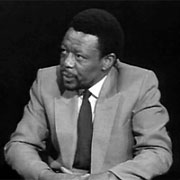
Mongane Wally Serote is a South African poet and writer. He became involved in political resistance to the apartheid government by joining the African National Congress (ANC) and in 1969 was arrested and detained for several months without trial. He subsequently spent years in exile, working in Botswana, and later London, England, for the ANC in their Arts and Culture Department, before eventually returning to South Africa in 1990. He was inaugurated as South Africa's National Poet Laureate in 2018.

The Defiance Campaign against Unjust Laws was presented by the African National Congress (ANC) at a conference held in Bloemfontein, South Africa in December 1951. The Campaign had roots in events leading up the conference. The demonstrations, taking place in 1952, were the first "large-scale, multi-racial political mobilization against apartheid laws under a common leadership".
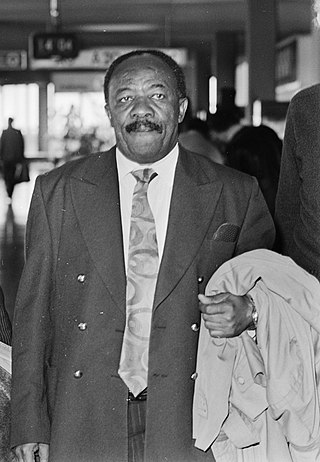
Alfred Baphethuxolo Nzo was a South African politician. He served as the longest-standing secretary-general of the African National Congress. He occupied this position (ANC) between 1969 and 1991. He was also the South African minister of foreign affairs from 1994 to 1999. He was also the first black health inspector in the country. The Alfred Nzo Award is now awarded to deserving health practitioners in South Africa.

The Treason Trial was a trial in Johannesburg in which 156 people, including Nelson Mandela, were arrested in a raid and accused of treason in South Africa in 1956.
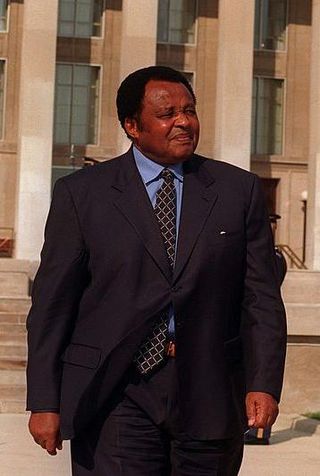
Johannes "Joe" Modise was a South African political figure. He helped to found uMkhonto we Sizwe, the military wing of the African National Congress, and was its longest serving Commander in Chief, deputised at different points in time by Joe Slovo and Chris Hani. Modise headed MK for a 25-year period, from 1965 to 1990. He served as South Africa's first black Minister of Defence from 1994 to 1999 and led the formation of the post-independence defence force.
The Shell House massacre was a 1994 shooting incident that took place at Shell House, the headquarters of the African National Congress (ANC), in central Johannesburg, South Africa in the lead up to the 1994 elections.

Thomas Titus Nkobi was a senior leader of the South African African National Congress (ANC) and a key figure in the Anti-Apartheid movement. Until his death he was the Treasurer General of the ANC and also its Member of Parliament.

Internal resistance to apartheid in South Africa originated from several independent sectors of South African society and took forms ranging from social movements and passive resistance to guerrilla warfare. Mass action against the ruling National Party (NP) government, coupled with South Africa's growing international isolation and economic sanctions, were instrumental in leading to negotiations to end apartheid, which began formally in 1990 and ended with South Africa's first multiracial elections under a universal franchise in 1994.
Daniel Mogoasha Mokonyane was a South African political revolutionary and writer and legal academic. Latterly residing in London, he was best known for his leadership during the 1957 Alexandra bus boycott, one of the most successful single-issue campaigns undertaken during Apartheid.
The Movement for a Democracy of Content was a revolutionary political organisation active in the US from the late 1940s to the early 1970s. With groups in the UK, the United States, West Germany and South Africa, the Movement is best known for publishing the influential political magazine Contemporary Issues - A Magazine for a Democracy of Content. Its German sister publication Dinge der Zeit, with much of the same content in German, published its last issue in August 1997. It is also known for its involvement in the 1957 Alexandra bus boycott in Johannesburg.
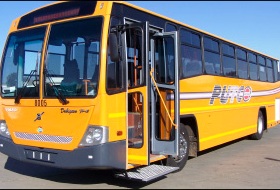
The Public Utility Transport Corporation (PUTCO) is a provider of commuter bus services in the provinces of Gauteng, Limpopo, and the western parts of Mpumalanga in South Africa. PUTCO was established in 1945 after the bus strike of 1944.
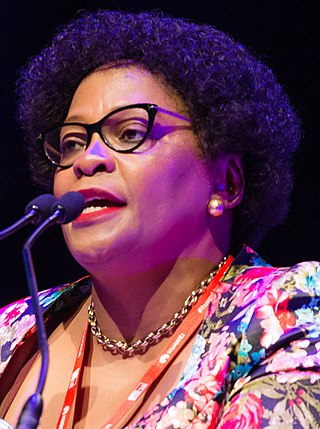
Nomvula Paula Mokonyane is a South African politician who is currently the First Deputy Secretary-General of the African National Congress (ANC). She was the first female Premier of Gauteng from 2009 to 2014 and subsequently served in the national government as Minister of Water and Sanitation from 2014 to 2018, Minister of Communications in 2018, and Minister of Environmental Affairs from 2018 to 2019.
Noordgesig is a township in Soweto, situated at the edge of area's northernmost boundary, but within its territory. It is the first township seen on entering Soweto from the frequently used New Canada Road. Noordgesig is a Coloured township. It is colloquially called "Bulte"(meaning Hills) by its residence and neighbors, as depicted by the Mine Dumps surrounding the Township. The name "Bulte" was coined as a form of endearment by the residence for the longest time.
Kopeng Obed Bapela is a South African politician who is currently serving as the Deputy Minister of Public Enterprises since 6 March 2023. Before that, he was Deputy Minister of Cooperative Governance and Traditional Affairs from 2014 to 2023. A member of the African National Congress (ANC), he has been a member of the National Assembly since 2002 and a deputy minister since 2010.
The potato boycott of 1959 was a consumer boycott in Bethal, South Africa during the Apartheid era against slave-like conditions of potato labourers in Bethal, Transvaal. The boycott started in June 1959 and ended in September 1959. Prominent figures of the movement included Gert Sibande, Ruth First, Michael Scott and Henry Nxumalo.
Bus boycotts in South Africa were a series of protests that took place in the Union of South Africa and in the present Republic of South Africa against increasing prices of transport fees and segregating practices during the Apartheid to the present.
Ignatius "Nash" Jacobs was a South African politician and strategist who served in the Executive Council of Gauteng, including as Member of the Executive Council (MEC) for Education from 1999 to 2004 and as MEC for Public Transport, Roads and Works from 2004 to 2009. After he left the provincial legislature in 2009, he was the General Manager of his political party, the African National Congress, until 2017.
Florence Mophosho was a South African politician and anti-apartheid activist of the African National Congress (ANC). A stalwart of the ANC Women's League, she was a member of the ANC National Executive Committee from 1975 until her death in 1985.